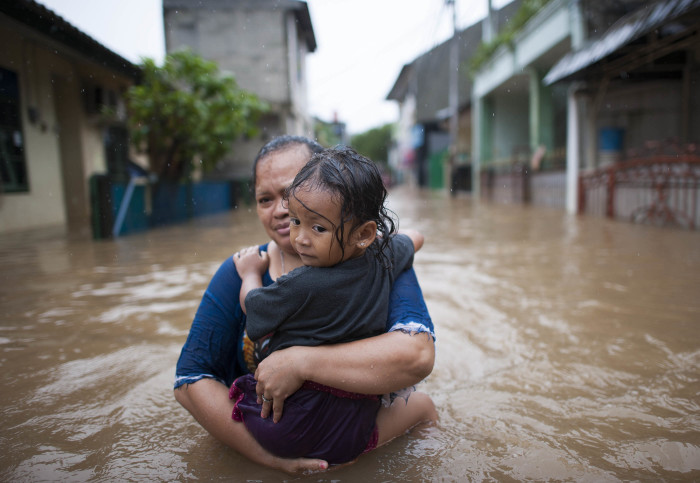Major UN report concludes world is off-track to fight climate change

The United in Science 2021 report shows climate change drivers and impacts are accelerating and not enough is being done to meet emissions targets.
The report – co-authored by Imperial College London researcher Dr Joeri Rogelj – presents the latest scientific data and findings related to climate change from multiple agencies.
The combined evidence in this report should empower anyone to make sure the report’s messages are heard in places of power by those making decisions about our future. Dr Joeri Rogelj
Its authors find that COVID-19 did not slow the relentless advance of climate change, and that there is no sign that countries are growing back greener, as carbon dioxide emissions have rebounded after a temporary blip due to the economic slowdown.
Data shows that greenhouse gas concentrations in the atmosphere continue to rise to record levels, committing the planet to dangerous future warming, and that rising global temperatures are fuelling devastating extreme weather throughout the world, with spiralling impacts on economies and societies. An estimated excess of 103 billion potential work hours were lost globally in 2019 compared with those lost in 2000.
The report also highlights that the past five years are among the warmest on record and there is an increasing likelihood that the average temperature will temporarily exceed 1.5°C above the pre-industrial era temperature in the next five years, which the Paris Agreement seeks to avoid.
The scale of recent changes across the climate system as a whole are unprecedented, and even with ambitious action to slow greenhouse gas emissions, sea levels will continue to rise and threaten low-lying islands and coastal populations throughout the world, according to the report.
No alternative to action
Dr Rogelj, from the Grantham Institute – Climate Change and the Environment at Imperial, said: “The messages in this report provide a grim and alarming picture. We are experiencing unprecedented climate change. We have caused it. And our actions to date are largely insufficient to avoid it from getting worse.
“The combined evidence in this report should empower anyone to make sure the report’s messages are heard in places of power by those making decisions about our future. The next climate summit, COP26 in November in Glasgow, is a key date where the world will have to come together to take the decisions necessary to halt climate change within our lifetimes.”
UN Secretary-General Antonio Guterres said: “This report is clear. Time is running out. For the 2021 United Nations Climate Change Conference in Glasgow, known as COP26, to be a turning point, we need all countries to commit to net zero emissions by 2050, backed up by concrete long-term strategies, and enhanced Nationally Determined Contributions which collectively cut global emissions by 45 per cent by 2030, compared to 2010 levels
“We need a breakthrough on protecting people and their livelihoods, with at least half of all public climate finance committed to building resilience and helping people adapt. And we need much greater solidarity, including full delivery of the long-standing climate finance pledge to help developing countries take climate action. There is no alternative if we are to achieve a safer, more sustainable and prosperous future for all.”
Key conclusions
The United in Science 2021 report, the third in a series, is coordinated by the World Meteorological Organization (WMO), with input from the UN Environment Programme (UNEP), the World Health Organization (WHO), the Intergovernmental Panel on Climate Change (IPCC), the Global Carbon Project (GCP), the World Climate Research Programme (WCRP) and the Met Office (UK).
Some of the key conclusions of the report are:
- Concentrations of the major greenhouse gases – carbon dioxide (CO2), methane (CH4) and nitrous oxide (N2O) continued to increase in 2020 and the first half of 2021.
- The increasing number of countries committing to net-zero emission goals is encouraging, with about 63% of global emissions now covered by such goals. However, to remain feasible and credible, these goals urgently need to be reflected in near-term policy and in significantly more ambitious Nationally Determined Contributions (NDCs) – non-binding national plans highlighting climate actions – for the period to 2030.
- The global average mean surface temperature for the period from 2017–2021 is among the warmest on record, estimated at 1.06 °C to 1.26 °C above pre-industrial (1850–1900) levels.
- 2021 recorded devastating extreme weather and climate events – a signature of man-made climate change has been identified in the extraordinary North American extreme heat and west European floods.
- Global mean sea levels rose 20 cm from 1900 to 2018 and at an accelerated rate of 3.7+0.5 mm/yr from 2006 to 2018.
- COVID-19 infections and climate hazards such as heatwaves, wildfires and poor air quality combine to threaten human health worldwide, putting vulnerable populations at particular risk.
- COVID-19 recovery efforts should be aligned with national climate change and air quality strategies to reduce risks from compounding and cascading climate hazards, and gain health co-benefits.
Read the full United in Science 2021 report on the WMO website.
Article text (excluding photos or graphics) © Imperial College London.
Photos and graphics subject to third party copyright used with permission or © Imperial College London.
Reporter
Hayley Dunning
Communications Division